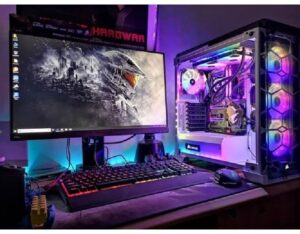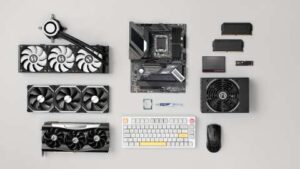Understanding Your Gaming Requirements

Understanding your gaming needs is the cornerstone of building a satisfying gaming experience. Whether you’re a casual gamer or a dedicated enthusiast, knowing what you want from your gaming setup is essential for making informed decisions about hardware, peripherals, and software. Before delving into the technical aspects, it’s imperative to reflect on your gaming habits, preferences, and priorities.
Types of Games:
Consider the genres you enjoy playing. Are you into fast-paced shooters, immersive open-world adventures, strategy games, or multiplayer competitions? Each genre has different demands on hardware and peripherals. For instance, a strategy game might benefit more from a high-resolution display and a comfortable keyboard, while a shooter might require precise aiming and responsive controls.
- Graphical Fidelity vs. Performance: Determine whether you prioritize stunning visuals or smooth gameplay. Some gamers prefer maxing out graphical settings for immersive experiences, while others prioritize high frame rates for competitive edge and responsiveness. Understanding your preference helps in choosing the right balance between graphical fidelity and performance when selecting hardware components like graphics cards and processors.
- Gaming Environment: Assess where you’ll primarily be gaming. Will you play mostly at home, where you can set up a dedicated gaming station with a large monitor or multiple displays? Or do you need a portable setup for gaming on the go, such as a powerful gaming laptop or a compact console? Your gaming environment influences decisions regarding form factor, portability, and connectivity options.
- Screen Size and Resolution: Consider your preferences for display size and resolution. A larger screen provides more immersive gameplay, while a higher resolution delivers sharper graphics and more detail. However, larger displays may not be suitable for portable setups, and higher resolutions require more powerful hardware to maintain smooth performance. Finding the right balance between screen size and resolution ensures an optimal gaming experience without compromising performance or portability.
- Streaming and Content Creation: Determine whether you’re interested in streaming your gameplay or creating gaming content. Streaming requires additional hardware for encoding and broadcasting, such as a powerful CPU and a reliable internet connection. Content creation, including video editing and graphic design, may benefit from specialized peripherals like high-resolution monitors, graphics tablets, and studio-quality microphones. Understanding these requirements helps in choosing hardware and peripherals tailored to your streaming and content creation needs.
Once you’ve answered these questions and gained insight into your gaming requirements, you can start exploring specific hardware components and technical specifications that align with your preferences and priorities. Here are some key considerations for each component:
- Graphics Card (GPU): If you prioritize graphical fidelity, look for a high-end GPU with ample VRAM and support for advanced features like ray tracing and DLSS. For performance-oriented gamers, prioritize GPUs with high core counts and clock speeds for smooth frame rates at high resolutions.
- Processor (CPU): A powerful CPU is essential for smooth gameplay, especially in CPU-intensive games and tasks like streaming and content creation. Choose a CPU with multiple cores and threads for multitasking and future-proofing your gaming setup.
- Memory (RAM): Opt for ample RAM to ensure smooth multitasking and seamless gameplay. Higher memory capacities and faster speeds help in loading large game files quickly and running multiple applications simultaneously without performance degradation.
- Storage (SSD/HDD): Invest in fast storage solutions like SSDs for quick game loading times and snappy system responsiveness. Consider additional storage space for storing large game libraries, recordings, and multimedia files.
- Display: Choose a display that meets your preferences for size, resolution, refresh rate, and panel type (e.g., TN, IPS, VA). Higher refresh rates and lower response times enhance gaming performance, while features like G-Sync and FreeSync reduce screen tearing and stuttering for smoother gameplay.
- Input Devices: Select gaming peripherals like keyboards, mice, and controllers that match your playstyle and ergonomic preferences. Look for features like mechanical switches, customizable buttons, and adjustable DPI settings for optimal comfort and performance.
- Audio: Invest in high-quality headphones or speakers for immersive audio experiences. Consider features like surround sound, noise cancellation, and microphone quality for clear communication in multiplayer games and streaming.
The Battle of Gaming Platforms: Laptop vs. Desktop
Gaming Laptops:
Gaming laptops have gained popularity due to their portability, allowing gamers to enjoy their favorite titles wherever they go. This flexibility appeals to individuals who travel frequently or prefer gaming in different locations. The compact design of gaming laptops makes them convenient for on-the-go gaming sessions, whether it’s at a friend’s house, a coffee shop, or during a long commute.
However, this portability often comes at a cost, both figuratively and literally. Gaming laptops tend to be more expensive than their desktop counterparts with similar specifications. The premium price tag is partly due to the engineering required to pack powerful hardware into a smaller form factor. Additionally, gaming laptops may sacrifice some performance compared to desktops with equivalent specifications due to thermal constraints and power limitations.
Furthermore, while gaming laptops offer a level of convenience, their upgradability is limited. Unlike desktops, where individual components can be easily swapped out and upgraded, gaming laptops are more restricted in this regard. Upgrading components like the GPU or CPU in a laptop can be complex or even impossible, depending on the model. As a result, gamers may find themselves needing to purchase a new laptop sooner to keep up with evolving gaming demands.
Gaming Desktops:

Gaming desktops are renowned for their performance and upgradability, making them a favorite among hardcore gamers and enthusiasts. These systems boast more powerful hardware components, superior cooling solutions, and greater customization options compared to laptops. With a desktop setup, gamers have the freedom to mix and match components to create a rig tailored to their specific needs and budget.
The upgradability of gaming desktops is one of their most significant advantages. Unlike laptops, where components are often soldered onto the motherboard or tightly integrated into the design, desktops allow for easy access to individual parts. This means gamers can upgrade their GPU, CPU, RAM, storage, and other components as technology advances or their gaming preferences change. As a result, gaming desktops offer longevity and scalability, ensuring that your rig remains relevant for years to come.
Additionally, gaming desktops typically offer better cooling solutions than laptops, thanks to their larger chassis and dedicated airflow designs. This superior cooling enables desktops to maintain peak performance for longer periods, reducing the risk of thermal throttling and hardware damage. It also allows for more aggressive overclocking, pushing hardware to its limits for maximum gaming performance.
However, gaming desktops lack the portability of laptops, requiring a dedicated space for setup. Unlike laptops, which can be easily packed up and transported, desktops are stationary by nature. Gamers must consider factors such as desk space, cable management, and power outlets when setting up a desktop gaming rig. While this limitation may not be a concern for some, others may find it restrictive, especially those with limited space or a need for mobility.
Key Hardware Considerations for Gaming Systems

When diving into the world of gaming, whether you opt for a laptop or desktop, understanding the key hardware considerations is vital for an immersive and smooth gaming experience. These components significantly impact performance, visuals, and overall gameplay satisfaction.
- Processor (CPU):
At the heart of any gaming setup lies the CPU, dictating how efficiently your system processes tasks. For gaming, prioritize multi-core processors from Intel or AMD, as they excel in handling the demands of modern games and multitasking. Look for CPUs with high clock speeds and ample cache to ensure seamless gameplay even during intense moments.
- Graphics Card (GPU):
The GPU holds immense importance in gaming setups, as it’s responsible for rendering visuals and determining frame rates. Dedicated gaming GPUs from NVIDIA or AMD are essential for optimal performance. Ensure the GPU has sufficient VRAM to handle your chosen resolution and graphics settings, ensuring crisp visuals and smooth gameplay.
- RAM:
Adequate RAM is crucial for gaming, especially in titles with high memory demands. Aim for a minimum of 8GB, though 16GB or more is recommended for smoother performance and multitasking. Opt for high-speed RAM modules to further enhance system responsiveness.
- Storage:
Fast storage is paramount for reducing loading times and enhancing overall system performance. Consider a combination of SSD for speedy boot times and game loading, coupled with an HDD for ample storage of game libraries and files. This dual setup balances speed and capacity, offering the best of both worlds.
- Display:
For laptops, prioritize display factors such as size, resolution, refresh rate, and panel type. Opt for IPS panels for better colors and viewing angles. Desktop gamers should invest in high-quality monitors featuring high refresh rates, low response times, and adaptive sync technologies like G-Sync or FreeSync for tear-free gaming experiences.
- Cooling:
Effective cooling is essential to prevent overheating and maintain optimal performance, especially during extended gaming sessions. Laptops with robust cooling solutions or desktop cases with adequate airflow and space for aftermarket cooling components ensure your system stays cool under pressure, prolonging its lifespan and preventing performance throttling.
- Portability and Battery Life (Laptops Only):
For gamers on the go, portability becomes a crucial consideration. When choosing a gaming laptop, consider factors such as weight, battery life, and connectivity options. Opt for laptops with extended battery life and versatile connectivity options to ensure uninterrupted gaming sessions, whether at home or on the move.
Budget Considerations
Embarking on the quest for the ideal gaming setup necessitates a clear understanding of your financial boundaries. Budgeting serves as the compass that steers your decisions, guiding you towards a rig that optimally balances performance and cost-effectiveness.
Establishing a budget upfront is paramount, providing a framework within which you can navigate the expansive landscape of gaming hardware. Without this foundational step, you risk succumbing to the allure of extravagant components, potentially overspending and compromising on other crucial aspects of your setup.
Prioritizing Performance: Strategic Allocation of Resources
Within the confines of your budget, strategic allocation of resources is imperative. Identifying the components that wield the most significant influence on gaming performance is key to maximizing the value of your investment. Among these, the GPU (Graphics Processing Unit) and CPU (Central Processing Unit) reign supreme, serving as the bedrock upon which immersive gaming experiences are constructed.
Investing a substantial portion of your budget in a high-quality GPU ensures that your rig can render breathtaking visuals with unparalleled fidelity. Whether traversing fantastical realms or engaging in intense firefights, a potent GPU empowers you to fully immerse yourself in the gaming landscape, free from the constraints of visual limitations.
Simultaneously, allocating adequate funds towards a robust CPU is essential for maintaining smooth gameplay and minimizing bottlenecks in processing power. A capable CPU not only enhances overall system performance but also enables seamless multitasking, allowing you to effortlessly stream, chat, and engage in other activities while gaming.
Navigating the Marketplace: Maximizing Value Through Strategic Purchases
In the vast expanse of the gaming hardware market, navigating the plethora of options can be a daunting endeavor. However, armed with a clear budget and an understanding of your performance priorities, you can navigate this terrain with confidence, maximizing the value of your purchases.
Shopping around for deals and comparing prices from different retailers empowers you to stretch your budget further, ensuring that every dollar is invested wisely. Online platforms and specialized retailers often offer competitive pricing, providing opportunities to snag coveted components at discounted rates.
Moreover, keeping a keen eye on seasonal sales events such as Black Friday and Cyber Monday can yield substantial savings. During these periods, retailers frequently offer enticing discounts on gaming hardware, enabling you to acquire premium components at a fraction of their regular price.
The Art of Compromise: Balancing Performance and Affordability
In the pursuit of building your gaming rig, it’s essential to embrace the art of compromise. While it’s tempting to pursue the latest flagship hardware across all components, financial constraints may necessitate a more pragmatic approach.
Identifying areas where slight concessions can be made without significantly compromising performance allows you to optimize your budget allocation. For instance, opting for a slightly lower-tier CPU or GPU model may yield considerable savings while still delivering a formidable gaming experience.
Furthermore, exploring alternative avenues such as refurbished or pre-owned hardware can provide access to premium components at reduced prices. While these options may require thorough scrutiny to ensure reliability, they offer a compelling opportunity to acquire high-performance hardware within a constrained budget.
Future-Proofing Your Setup
Future-proofing your gaming setup is an ongoing challenge in an industry where technological advancements occur at a rapid pace. While it’s impossible to completely future-proof your setup, there are several strategies you can employ to ensure your rig remains relevant and capable for as long as possible.
First and foremost, investing in a gaming rig with a modular design is key. A modular design allows for easy upgrades and component swaps, meaning you can adapt to new technologies and advancements without having to replace your entire system. Look for cases, motherboards, and other components that are designed with modularity in mind, allowing you to easily add or replace parts as needed.
When selecting components for your gaming rig, opt for those that offer room for future expansion. For example, choose a motherboard with additional RAM slots and PCIe lanes, allowing you to upgrade your memory and add new peripherals without limitations. Similarly, consider investing in a power supply unit (PSU) with ample wattage and connectors to support future upgrades without having to replace it.
Stay informed about emerging technologies in the gaming industry, such as ray tracing and virtual reality (VR), and consider whether your setup can support them in the future. While these technologies may not be mainstream now, they are likely to become more prevalent in the coming years, so it’s important to plan ahead and ensure your system is capable of handling them.
Regular maintenance and upgrades are also essential for extending the lifespan of your gaming rig. Keep your hardware clean and dust-free to prevent overheating and performance issues. Monitor temperatures regularly and invest in additional cooling solutions if necessary to keep your system running smoothly.
Additionally, be proactive about replacing components as needed to keep your system up to date. As new technologies emerge and hardware requirements evolve, certain components may become obsolete or inadequate for modern gaming needs. By staying vigilant and upgrading components as necessary, you can ensure that your gaming rig remains capable and competitive for years to come.
Future-proofing your gaming setup requires a combination of strategic planning, smart investment choices, and regular maintenance. While it’s impossible to predict exactly what the future holds for gaming hardware, by following these guidelines, you can ensure that your rig remains relevant and capable for as long as possible, allowing you to enjoy the latest games and technologies without having to constantly upgrade your system.
Conclusion
Choosing the right laptop or desktop for your gaming needs is a significant decision that requires careful consideration. By understanding your gaming requirements, weighing the pros and cons of different form factors, and prioritizing key hardware components, you can select a gaming rig that delivers the performance and experience you desire.
Whether you opt for a portable gaming laptop or a powerful desktop setup, remember to factor in budget considerations, future-proofing strategies, and maintenance efforts to ensure your gaming rig stands the test of time.



